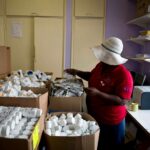Malawi leader joins global anti-HIV drive
Published on August 29, 2014 at 8:41 AM by Face of Malawi
has joined 15 other world leaders in pledging government commitment to wage war against HIV/AIDS through the global ‘Protect the Goal’ campaign.
Mutharika signed the declaration at the presidential Sanjika Palace at a colorful ceremony that saw football, music and political icons converging on the ceremony where visiting Ghanaian football superstar Asamoah Gyan, renowned saxophonist Steve Bedi and local music artist Skeffa Chimoto spiced the event with song and dance.
Mutharika said Malawi had made strides in the fight against HIV/AIDS, but more can be done, admitting that the rate of new HIV infections in Malawi is very high by any standard.
“This is a serious threat to the national response to HIV/AIDS. The other challenge is that the HIV prevalence rate among young people aged between 15 and 24 is at 3.6 percent with highest rates registered among girls at 5.2 percent,” Mutharika said.
“Today, 310 000 of our young people are living with HIV. That is why I find the ‘Protect the Goal Campaign’ very relevant to our circumstances,” he added.
Gyan, who is the lead sports celebrity for ‘Protect the Goal’ in Ghana, has urged footballers in Malawi to play a leading role in the fight against AIDS, saying “Africa remains the epicenter of the HIV/Aids pandemic…and this is unfinished business.”
The campaign is one of a series of activities co-organized by the National AIDS Commission (NAC) and U.N. Program on HIV/AIDS (UNAIDS) to reduce infections through condomising, circumcision and testing.
For his part, U.N. resident representative in Malawi Mai Seppo expressed gladness for seeing more football stars and heads of state joining the fight against the HIV/AIDS.
“My passion is to advocate against new HIV infections among youth. ‘Protect the Goal’ is the language I understand,” said Seppo.
Others who attended the event included Malawi football star Francis Mulimbika, Sports Minister Grace Chiumia and Football Association of Malawi (FAM) president Walter Nyamilandu.
Earlier in the day, Gyan visited a local circumcision center where he helped in the circumcision of a young boy.
Globally, circumcision is considered a vital feature towards reducing the risk of transmission of sexually transmitted diseases, including HIV/AIDS.
In Malawi, 50 percent of the population is aged 17 years or less, of whom 51.5 percent are female.
HIV prevalence among Malawians in the age range between 15 and 17 years has more than doubled since 2004 and only 42 percent of youths between 15 and 24 years of age have accurate and comprehensive knowledge of HIV.




